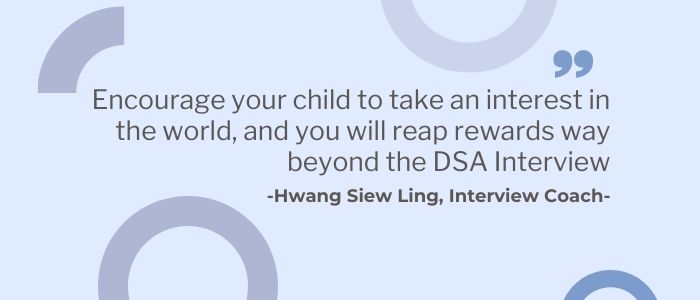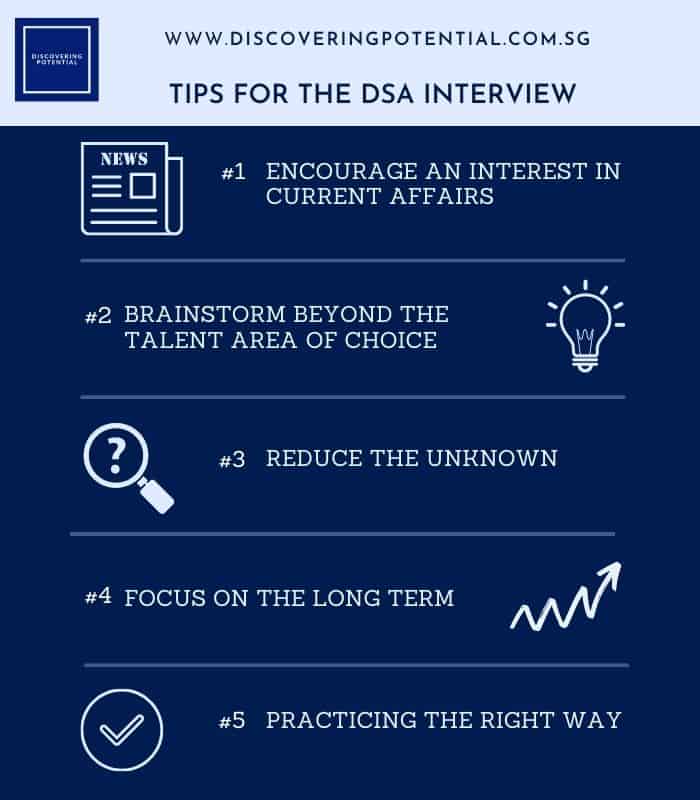The DSA Interview – How to set your child up for success
Submitted by Advertiser KiasuParent
The DSA Interview in Primary 6 may be the first time our children may experience an interview.
As parents, how do we prepare our children for the DSA Interview, and most importantly, how do we set them up for success?
The most unique (and equally frustrating) thing about an interview is that it is a situation that is almost never replicated in our daily life. Yet, our career goals and life goals hinges on this moment, and the outcome of the interview could take us to new heights. Interviews are still the predominant method of recruitment selection globally and is therefore an essential skill to master.
Through my experience as an Interview Skills Coach, I have coached many children and youths for their interviews. In this article, I will share some tips for parents and children who are considering the DSA-Secondary route and who want to know how they can ace the DSA Interview.
What interview questions should I prepare for?
While the interview questions may differ for each talent area, there are some key areas which you can help your child think about prior to the interview. I have listed 5 key areas and some sample questions below.
(a) Background questions
- Tell me about yourself
- Describe yourself using one word
- How would your friends describe you?
(b) Knowledge about the school
- Knowledge about the school
- Why do you want to join our school?
- What do you think about our curriculum / program?
- Are we your top choice?
(c) Current affairs
- What current news in the world has caught your attention and why?
- If you could solve one social problem in Singapore, what would it be?
- What do you think about the issue of our aging population in Singapore?
(d) Skills
- Tell me more about your leadership experience in your CCA?
- What was the most difficult part about this project and why?
- Could you describe how you contributed to this project?
(e) Behavioral/situational
- Could you share with us a time when you failed to achieve your goals?
- Do you get stressed?
- How do you deal with team members who disagree with you?
These are some of the key areas that the DSA Interview may cover. Together with your child, you can encourage them to think about how they would answer these questions, but do bear in mind that preparing for the interview using the right technique is key. We discuss this point further in our tips below. Do note also that some talent areas may involve more specific skill tests such as math problem solving, science questions etc.
Contrary to popular belief, performing well at interviews does not hinge on knowing the questions. While it does contribute towards overall preparedness, there are other important factors, both mental and emotional, which helps to form a strong foundation for your child when tackling future interviews. Drilling them on questions, without building a strong foundation, is akin to cramming for exams. It may work well in the short term, but may not be the best way to encourage a strong performance, especially in the longer term. As an interview coach, improvements that come from a strong foundation is a focal point of my coaching, as I want each child to be empowered with interview skills that will carry them beyond their schooling years.
What can we do to set our child up for success in a DSA Interview?
Tip 1: Encourage an interest in current affairs
As a parent myself, I understand that this may be a difficult battle for some parents but it has an immense long-lasting impact. Starting today, encourage your child to take an interest in the news, preferably on a long-term, consistent basis. If they do not already have the habit of reading the news, try not to create a news cramming session just prior to the interview. Instead, take small steps and encourage them to read an article or two of the newspaper each day. Try to discuss social and current affairs at the dinner table, and have them practice providing their opinion on events or developments that are happening around us.
Knowledge of current affairs is a common aspect which interviewers use to differentiate a candidate. Does the candidate have an interest in a wide range of world and social issues or does he/she focus only on their individual development? Is the candidate able to take a stand on matters of debate and verbalize their opinion clearly and yet respectfully?
Based on my experience, many youths attain their knowledge of current affairs by reading digital summaries online, perhaps through email notifications or apps. This has a tendency to provide false confidence that they are in the know, as this method of reading provides superficial knowledge, and they may have only taken a glance at the headline or the article. In order to speak well about a range of world issues, they will need to read beyond the headlines. Encourage your child to take an interest in the world, and you will reap rewards way beyond the DSA Interview.

Tip 2: Brainstorm beyond the talent area of choice
When your child has been shortlisted for the interview, it means that their achievements in the talent area they applied for have already been considered. It also means that everyone who is shortlisted has shown a degree of excellence in that particular talent area. Help your child brainstorm what else you want the interviewers to know. Provide the interviewer with a holistic idea of who your child is, what they get motivated by and what they care about. For example, if the area of talent applied for is a sport, think about areas of leadership (in the sport and beyond), academic achievements, volunteer work, community work, interests, hobbies, and others. Talk to your child and brainstorm together with them on the things they have done in recent years. While it sounds like a superficial activity, the benefit of doing this brainstorming activity is highly underestimated. This is a neuro-linguistic programming technique I use which has great outcomes for the clients.
Tip 3: Reduce the unknown
The interview is generally nerve wracking for most children, and one of the things that helps to manage their nerves is for them to know as much as possible about the interview. Try to find out what you can about the interview and talk them through what to expect. Where possible, determine the interview structure (digital or physical), number of interviewers, name of the interviewers, number of interviewees, location of the interview etc. If it is a digital interview, familiarize yourselves with the set-up and test run the equipment. And, here is a small but highly important tip. Do not just test run the equipment but ask your child to record themselves speaking, watch the recording and see it through the eyes of the interviewer. Note the details such as lighting, sound quality, angle of the face and make adjustments as necessary. Take note of habits such as shifting, and filler words like umms and ahhs. It is about what the interviewer sees and hears, and not what you think the interviewer sees and hears. This is useful regardless of whether it is a digital or physical interview.
With the information you have, help them visualize the interview in their mind and remove as many unknowns as possible, leaving them to focus on doing their best at answering the questions.
Tip 4: Focus on the long term
Children who do well in high stress situations such as the DSA Interview, are usually able to see beyond the moment. Align your objectives with theirs and let them understand how this moment is just one step and one experience in a long-term journey of self-development. While we want to encourage them to do their best, let them see how it is the experience itself that they accumulate and will lean on to achieve their future career and life goals. It is not about the outcome but the effort and experience. Just like how it is for adults when they are job-seeking, every interview represents a learning experience, and a growth mindset is essential. Regardless of the outcome, the experience will be invaluable. Focusing strictly on the DSA Interview can create tensions that places the child on a shaky footing before he/she even commences the interview. Do remember that this interview may be the first, but it is definitely not the last in their lives.
Tip 5: Practicing the right way
While we all know the old adage of “practice makes perfect”, it is essential to understand that practice does not make perfect if you are practicing it wrong. This may be the ultimate point that tips someone from being an average candidate to a great candidate. Do also recognize that every child is different and there is no “perfect” answer for them to memorize. Good interviewers can easily identify candidates who are speaking from memory and who lacks genuine sincerity in what they say. Many candidates practice hard for their interviews, but how they practice may not be ideal. Here are some of the common mistakes I see:
- Memorizing answers from Google
- Practicing by writing or typing and not by speaking
- Regurgitating “perfect” answers instead of speaking with sincerity
These issues create candidates who become robotic like in their demeanor, and have a very high tendency to get easily stressed out by questions they have never seen, or are different to those they practiced. The strong reliance on rote-learning and written answers do not prepare them well for the real interview situation which requires them to deal with their nerves, think on their feet, show critical thinking with all types of questions including left-field questions, answer succinctly and sincerely, and build rapport with the interviewer. Some children have been coached with an “ideal” answer, and they try their very best to replicate it, but under moments of stress, this technique has a tendency to trip them up and affect their confidence each time they cannot deliver the “ideal” answer. I have seen how this becomes a vicious cycle – each time they do not deliver the “ideal” answer, the confidence level drops, they get more nervous, and then they try the same technique again on the next question, and by the end of the interview, their confidence has been eroded.

The interview is a niche situation, so having proper practice, coaching and feedback for your child’s interview skills can make the entire process a much more valuable learning experience and more focused for success, and not just for this particular DSA interview, but for all future interviews they will encounter. Interview skills encompasses many important life skills that they will need in their academic and career path, including communication skills, self-confidence, ability to manage your nerves, situational aptitude, critical thinking and more.
 At Discovering Potential, we specialize in coaching on a 1-on-1 basis as well as conducting workshops. We coach each child from the inside out, starting with understanding and respecting their individual personality types. We augment our interview and communication skills with our expertise in neuro-linguistic programming and behavioral consulting which allows us to observe and coach the child on both non-verbal and verbal communication skills including small nuances such as their facial responses, non-verbal habits and reactions. We empower them with interview skills and techniques to take on any type of question, building self-awareness and confidence along the way so that they can build on the coaching to achieve a greater level of interview skills for their future.
At Discovering Potential, we specialize in coaching on a 1-on-1 basis as well as conducting workshops. We coach each child from the inside out, starting with understanding and respecting their individual personality types. We augment our interview and communication skills with our expertise in neuro-linguistic programming and behavioral consulting which allows us to observe and coach the child on both non-verbal and verbal communication skills including small nuances such as their facial responses, non-verbal habits and reactions. We empower them with interview skills and techniques to take on any type of question, building self-awareness and confidence along the way so that they can build on the coaching to achieve a greater level of interview skills for their future.
Written by: Siew Ling Hwang, Founder and Principal Interview Coach, Discovering Potential www.discoveringpotential.com.sg
Ms Siew Ling Hwang has extensive experience providing interview skills training. She specialises in conducting 1-on-1 training and workshops for those seeking to improve their interview skills for school interviews as well as for job interviews. She is an Interview Skills and Communications Skills Coach, a Certified Practitioner of Neuro Linguistic Programming (NLP) and NLP Coaching, as well as a Certified Advanced Behavioural Analyst and Career Coach. Her unique skillset in combining real world practices, NLP Coaching techniques and personality and behavioural expertise provides clients with an effective session to achieve real improvements that carry them beyond the interview they are preparing for.